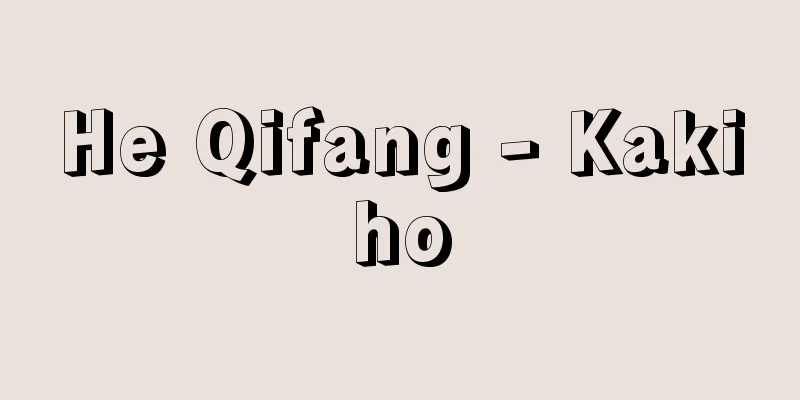He Qifang - Kakiho

|
Chinese poet and critic. Born on February 5th in Wanxian, Sichuan Province. He began writing poetry and prose while studying at Beijing University, and after graduation, he attracted attention with his collection of poems "Hanyuanshu" (Collection of Poems from the Han Garden), published with Bian Zhilin and Li Guangtian. Many of his early works are delicate and intellectual, influenced by French symbolist poetry. After the start of the anti-Japanese war, he returned to Sichuan, but moved to Yan'an in August 1938, and joined the Communist Party in the same year. He gradually changed his style while serving in the military and teaching at Lu Xun Academy of Art. His collection of poems "Night Songs" (1945) conveyed his inner thoughts and had a strong influence on the intellectual youth of the time. During the War of Resistance against Japan, he criticized the theories of Hu Feng, who advocated the importance of "subjectivity" in Chongqing, from a realist standpoint, and gradually shifted the focus of his work to criticism. After liberation, he served as director of the Institute of Literature at the Academy of Sciences and published many leading papers. His criticism was characterized by its attention to detail backed by extensive academic knowledge. Although he did not succumb to criticism during the Cultural Revolution, he died of stomach cancer on July 24, 1977, shortly after the overthrow of the Gang of Four. He wrote many collections of poems, prose, and essays, which have been compiled into Selected Works of He Qifang (1979), as well as Selected Writings of He Qifang compiled by the Institute of Literature. [Noboru Maruyama] Source: Shogakukan Encyclopedia Nipponica About Encyclopedia Nipponica Information | Legend |
|
中国の詩人、批評家。2月5日、四川(しせん/スーチョワン)省万県(ばんけん/ワンシエン)に生まれる。北京(ペキン)大学在学中から詩、散文を書き始め、卒業後、卞之琳(べんしりん/ピェンチーリン)、李広田(りこうでん/リーコワンテン)とともに出した詩集『漢園集』で注目を浴びた。初期のものには、フランス象徴詩派の影響を受けた繊細で主知的な作品が多い。抗日戦開始後、四川に帰ったが、38年8月延安(えんあん/イエンアン)へ移り、同年共産党に入党。従軍したり魯迅(ろじん)芸術学院の教師を務めたりするなかで、作風をしだいに変えた。詩集『夜歌』(1945)はその内面を伝え、当時の知識青年に強い影響を与えた。抗日戦争中、重慶(じゅうけい/チョンチン)で「主観」重視を唱えていた胡風(こふう/フーフォン)の理論をリアリズムの立場から批判したのをはじめ、仕事の重点をしだいに批評に移し、解放後は科学院文学研究所所長を務め、多くの指導的論文を発表した。その評論は豊かな学識に支えられたきめの細かさを特色としている。文化大革命中の非難には屈しなかったが、四人組打倒後まもない77年7月24日、胃癌(いがん)で死去した。詩集、散文集、評論集多数があり、『何其芳選集』(1979)にまとめられているほか、文学研究所の手になる『何其芳文集』がある。 [丸山 昇] 出典 小学館 日本大百科全書(ニッポニカ)日本大百科全書(ニッポニカ)について 情報 | 凡例 |
<<: Kakimochi (missing rice cake) - Kakimochi
Recommend
Auxiliary ship
…The wartime hastily constructed anti-submarine a...
Ainokobune - Ainokobune
A sailing ship of Japanese and Western influences ...
Catarrhal inflammation
…Eczema (2)Fibrinous inflammation A condition acc...
Hannes Olof Gösta Alfvén
Swedish physicist. After receiving his doctorate ...
EHD Power Generation - EHD Power Generation
…However, in direct power generation, there are n...
SSD - Solid State Disk
A disk drive that uses large-capacity flash memory...
GameTangium
…They are found widely in animals and plants that...
Masao Ohta
⇒ Mokutaro Kinoshita Source: Kodansha Digital Japa...
Morskoe Uchi-li-shche (English notation)Morskoe Uchilishche
... Outside of the United States, the British Roy...
Kwantung Army
One of the Japanese colonial standing armies, an ...
Criminology; Kriminologie
In the narrow sense, it refers to criminology. In ...
Akimichi Hasegawa
1816 * -1897 A samurai from the late Edo period. ...
Muscle fiber
〘 noun 〙 A fibrous cell that makes up the muscle t...
Honzaka Pass
A pass located in northwest Shizuoka Prefecture, ...
Ocean Thermal Energy Conversion
Also known as ocean thermal energy conversion. Pow...









